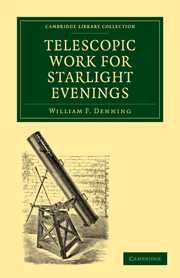Book contents
- Frontmatter
- PREFACE
- Contents
- ILLUSTRATIONS
- CHAPTER I THE TELESCOPE, ITS INVENTION AND THE DEVELOPMENT OF ITS POWERS
- CHAPTER II RELATIVE MERITS OF LARGE AND SMALL TELESCOPES
- CHAPTER III NOTES ON TELESCOPES AND THEIR ACCESSORIES
- CHAPTER IV NOTES ON TELESCOPIC WORK
- CHAPTER V THE SUN
- CHAPTER VI THE MOON
- CHAPTER VII MERCURY
- CHAPTER VIII VENUS
- CHAPTER IX MARS
- CHAPTER X THE PLANETOIDS
- CHAPTER XI JUPITER
- CHAPTER XII SATURN
- CHAPTER XIII URANUS AND NEPTUNE
- CHAPTER XIV COMETS AND COMET-SEEKING
- CHAPTER XV METEORS AND METEORIC OBSERVATIONS
- CHAPTER XVI THE STARS
- CHAPTER XVII NEBULÆ AND CLUSTERS OF STARS
- NOTES AND ADDITIONS
- INDEX
- Plate section
CHAPTER VIII - VENUS
Published online by Cambridge University Press: 05 July 2011
- Frontmatter
- PREFACE
- Contents
- ILLUSTRATIONS
- CHAPTER I THE TELESCOPE, ITS INVENTION AND THE DEVELOPMENT OF ITS POWERS
- CHAPTER II RELATIVE MERITS OF LARGE AND SMALL TELESCOPES
- CHAPTER III NOTES ON TELESCOPES AND THEIR ACCESSORIES
- CHAPTER IV NOTES ON TELESCOPIC WORK
- CHAPTER V THE SUN
- CHAPTER VI THE MOON
- CHAPTER VII MERCURY
- CHAPTER VIII VENUS
- CHAPTER IX MARS
- CHAPTER X THE PLANETOIDS
- CHAPTER XI JUPITER
- CHAPTER XII SATURN
- CHAPTER XIII URANUS AND NEPTUNE
- CHAPTER XIV COMETS AND COMET-SEEKING
- CHAPTER XV METEORS AND METEORIC OBSERVATIONS
- CHAPTER XVI THE STARS
- CHAPTER XVII NEBULÆ AND CLUSTERS OF STARS
- NOTES AND ADDITIONS
- INDEX
- Plate section
Summary
“Friend to mankind, she glitters from afar,—
Now the bright evening, now the morning star.”
Beauty of Venus.—This planet has an expressive name, and it naturally leads us to expect that the object to which it is applied is a beautiful one. The observer will not be disappointed in this anticipation: he will find Venus the most attractive planet of our system. No such difficulties are encountered in finding Venus as in detecting Mercury; for the former recedes to a distance of 47° from the Sun, and sometimes remains visible 4½ hours after sunset, as in February 1889. But Venus owes her beauty not so much to favourable position as to surpassing lustre. None of the other planets can compare with her in respect to brilliancy. The giant planet Jupiter is pale beside her, and offers no parallel. Ruddy Mars looks faint in her presence, and does not assume to rivalry.
This planet alternately adorns the morning and evening sky, as she reaches her W. and E. elongations from the Sun. The ancients styled her Lucifer (“the harbinger of day”) when a morning star and Hesperus when an evening star.
Brilliancy.—Her brightness is such as to lead her to occasionally become a conspicuous object to the naked eye in daytime, and at night she casts a perceptible shadow.
- Type
- Chapter
- Information
- Telescopic Work for Starlight Evenings , pp. 145 - 154Publisher: Cambridge University PressPrint publication year: 2010First published in: 1891



